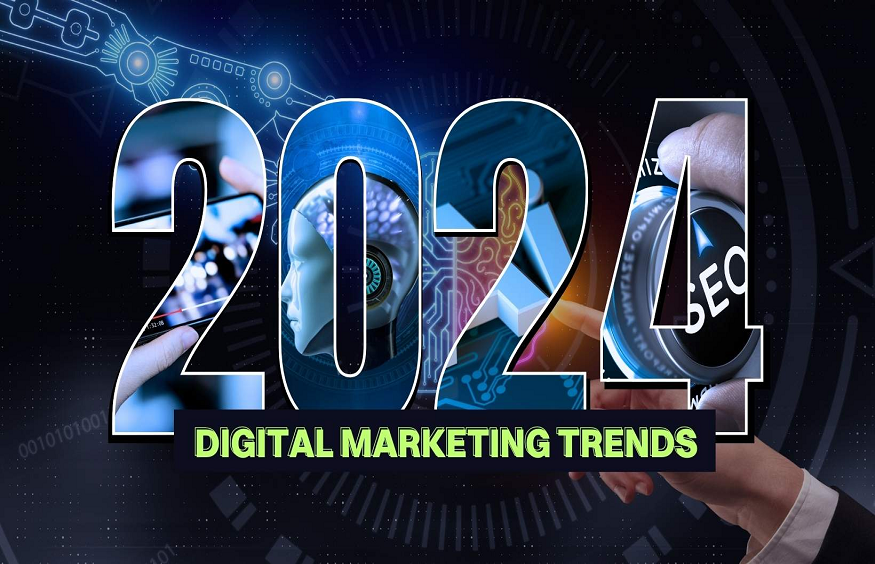Keeping up with the latest developments in digital marketing trends is not only a competitive advantage, but also an absolute requirement.
By the year 2024, the SEO environment will continue to undergo transformations, which will bring up new chances and difficulties for enterprises to expand.
What are the five most important trends in digital marketing for the year 2024? For the purpose of assisting you in planning and getting ready, we have compiled their forecasts.
Let’s have a look at the trends that we feel will have a significant impact on the way in which in the coming year, businesses will connect with their audience.
AI will continue to revolutionize digital marketing
AI, which stands for artificial intelligence, is not merely a buzzword. For those who work in digital marketing, it has become a game-changer.
Machine learning and predictive analytics are two applications of artificial intelligence that not only enable businesses to analyze large amounts of data in order to gain important insights, but also to generate content that is relevant in a short amount of time. There is a significant amount of time and money saved, as well as an increase in productivity.
It has been estimated by McKinsey that generative artificial intelligence might potentially add up to $4.4 trillion to the annual global output.
According to the findings of the investigation, marketing and sales are one of the four functional areas that have the potential to generate an estimated 75% of this value when working together.
As a result of the influence of artificial intelligence, the paper also predicts that the productivity of marketing alone may grow by between 5 and 15 percent of overall marketing spend, which would amount to approximately 463 billion dollars annually.
The impact
It would be impossible to overstate the influence that AI has had on digital marketing. AI improves both productivity and accuracy in a variety of uses, including automating mundane work and anticipating the behavior of customers.
With this capability, marketers are able to personalize content and adverts according to the tastes of specific customers, which has the potential to boost engagement and conversion statistics.
Nevertheless, if every firm were to replace its marketing personnel with AI engines, the end result would be that every brand would eventually sound the same.
It is possible that differentiation may cease to exist, and the personalizable material that can be produced in large quantities using AI will either become generic or extreme as businesses strive to differentiate themselves from their competitors.
When incorporating artificial intelligence into your digital marketing plan, it is essential to continue manufacturing content that is genuine and pertinent to your target audience.
Yes, artificial intelligence has the potential to speed up the process; however, the strategy and the criteria for success must come first.
Hyper personalization and crafting tailored experiences
When it comes to their interactions with brands, customers anticipate receiving individualized messages and experiences, thus the days of marketing that is universally applicable are long gone.
This trend in digital marketing, which involves personalizing information, recommendations, and offers to match the specific requirements and tastes of individual consumers, is only going to become more significant in the year 2024.
According to research conducted by Deloitte, ninety percent of clients found personalized marketing intriguing. It would appear that there is a disparity between the way in which businesses perceive their own performance in terms of personalization and the way in which customers perceive it.
According to Segment, only sixty percent of customers believe that they receive individualized experiences, despite the fact that eighty-five percent of businesses believe they do.
The impact
The implementation of hyper-personalization into your digital marketing plan may lead to an increase in the level of happiness and loyalty experienced by your customers.
Businesses have the ability to cultivate a better relationship with their audience by offering content that connects with each individual. As a consequence, this results in increased conversion rates as well as increased brand advocacy.
In spite of this, there are a few drawbacks that marketers have to be aware of before utilizing hyper-personalization.
Some of these include concerns regarding privacy, needs regarding resources, and a dependence on the quality of the data.
Voice search optimization and speaking the language of users
Consumers are increasingly using speech-activated gadgets, which has led to an increase in the proliferation of voice search. It has been reported by the Tech Report that 41 percent of adults use voice search on a daily basis.
We anticipate that this number will continue to rise. People’s ways of interacting with technology are changing as a result of voice search, which is more than just a feature.
Understanding the natural speech patterns of your customers and adapting your search engine optimization tactics to accommodate conversational search inquiries are two steps that are necessary for optimizing content for voice search and speaking the language of your customers.
The keywords and phrases that you choose to be relevant for voice search should be strategically distributed throughout your content in a manner that contributes to the quality and value of what you are delivering rather than detracting from it.
The impact
Voice searches are usually done in a casual tone, which is something that everyone knows. Think about how you use voice search for a while.
If you want to find the “best gaming computer,” you might ask your phone, “which is the best gaming computer for running [insert your favorite game here!]?” instead of typing that search term into your internet browser.
Digital marketers should think again about how they create content and make that content search engine optimized because of these talk requests.
You might want to use long-tail terms like “do I need,” “should I,” and “what is” to answer the questions that your customers want to know.
Social media as a search engine
Social media sites, especially TikTok, are no longer just places to have fun. They are also turning into search engines in their own right.
Not only are people using these platforms to network, but they are also using them more and more to find new products, services, and information.
Search Engine Land says that TikTok is the most popular search engine among more than half of Generation Z students.
Their research showed that the three most important reasons for this change were the video style of the results; answers that were more relatable, and answer that were tailored to each person.
The impact
Given how social media can be used as a search engine, people have changed how they act in big ways. Businesses can reach a large group of people who are constantly looking for new and interesting information by using these platforms effectively and taking a personalized approach.
TikTok and other social media sites have grown into powerful tools that can be used to find new brands and spread the word about them.
On the other hand, it’s important for businesses to keep their attention on their target group and the ways they like to get information.
Ongoing focus on privacy and obtaining first party data
It should be the top goal for digital marketers in 2024 to keep talking about privacy issues. This is because private rules are likely to have more and more effects in the future.
Due to stricter rules being put in place all over the world, consumers are also becoming much more aware of their own data.
54 percent of people are very likely to leave a company that asks for personal information in order to do business with them, according to LXA. There may be a phone number or email address in this list.
The impact
One of the hardest things for digital marketers to do to protect their customers’ data and privacy is to make sure they follow rules like the General Data Protection Regulation (GDPR) and the California Consumer Privacy Act (CCPA).
With these steps, businesses are given strict rules for gathering, storing, and using the information that their customers and potential customers give them.
Along with these limits, another thing that needs to be thought about is how users of ad blockers and privacy technologies affect things.
Using these tools naturally makes it harder for digital marketers to connect with their target audience and keep an eye on how well their online marketing is working.
This is meant to make sure that you have direct permission from your customers to get their information and that that information is treated correctly and can be used to give your customers something of value.
Conclusion
The field of digital marketing, which is growing quickly, will see huge changes in 2024. Voice search is becoming more popular and people want things to be more personalized. These are the trends that will drive these changes.
Even though there is a lot of exciting potential out there, businesses need to be careful. This is especially true when it comes to technologies that block ads and protect users’ privacy.
To be successful in this field, you need to be able to quickly adapt to new situations, be able to see how things might change, and be dedicated to giving people real, one-of-a-kind experiences.
With the help of a digital agency, businesses will be ready to ride the digital wave and make the most of its full potential as it keeps rising. This will make sure they stay on the cutting edge of growth, involvement, and new ideas.
In order to get ready for the digital trip that will happen in 2024, businesses must now plan their course with educated precision and strategic flair. Alternatively, they can also ask help from a performance agency for their SEM needs.


